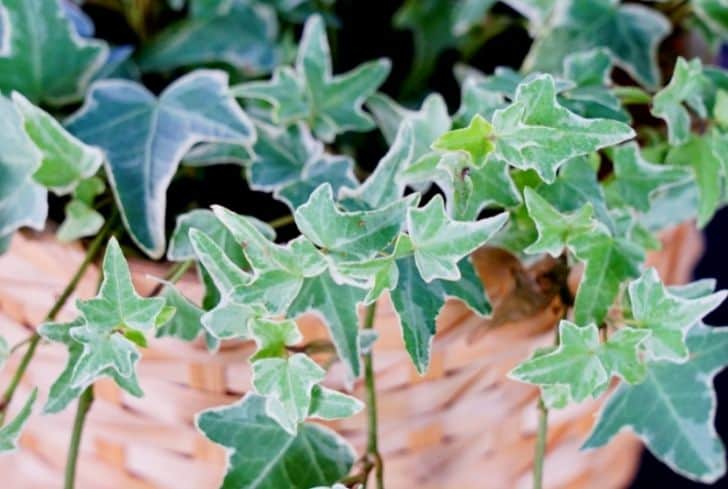If you’re wondering whether Roundup kills ivy, the answer is a resounding yes. Roundup is known to work on some specific species of Ivies, especially the English Ivy. The solution works on other ivies as well because you can control the growth of these plants with the right Roundup solution.
In the following few sections, we will take a deeper dive into the topic and try to understand whether Roundup indeed works on ivy.
Does Roundup Work on Ivy?
For the Roundup to work on Ivy, you need to spray it on the soft and beautiful new leaves during the spring months. You need to be especially careful about this because you don’t want the waxy coating on the ivies to get thicker and hard.
In case the ivy is in a desirable position with other valuable plants in the proximity, just make sure you give the leaves a soft brush of the Roundup solution or concentrate.
If you find the plant growing upwards with an identifiable trunk, you can also cut it off and paint the stump with Roundup concentrate paint. This works best during the fall season, so if you are planning to chop off the barks, make sure you do it when it is seasonally appropriate.
How Long Does it Take Roundup To Kill Ivy?
Roundup comes with two primary ingredients namely glyphosate and triclopyr. Both these ingredients are resistant to rain. So, the moment you apply them, you can start to witness some results over the next half an hour.
At this point, you will find your ivies withering out and assuming a yellowish hue. However, this is best visible after 24 hours of application. You can use several variants of Roundup to expedite the process.
For instance, you might want to use concentrated formulas that can get ready in minutes. Alternatively, you can also get other variants of a Roundup.
What Kills Ivy Permanently?
You can try out several techniques to get rid of ivies for good. While some of the following techniques work best on English ivies, others work equally well on every variant of ivy.
So, if you are wondering how to start and what to use to get rid of those pesky ivies, here’s everything you need to know.
1. White Vinegar
If you’re looking for a surefire way to get rid of ivies for good, try using white vinegar. Many homeowners are already familiar with white vinegar as you use it to clean off your home and get rid of limescale stains.
Luckily, the product is just as good when it comes to getting rid of ivies. Just add 20% white vinegar to 80% water and allow the concoction to settle. Next, transfer it to a spray bottle or any similar bottle and start spraying the solution on those pesky ivies.
Be careful while spraying because you only want to target the ivies and not the other plants that make your garden beautiful. For best results, spritz the mixture once in a couple of days, and as you see the plants drying out, simply pull them off.
Use gloves to avoid contact and potential infections.
2. Glyphosate-based products
As you already know, glyphosate-based products like Roundups are one of the best ways to get rid of ivies from your garden. However, there is a caveat when applying glyphosate mix.
Because this solution doesn’t distinguish between your other pretty plants and ivy, you might inadvertently damage the other plants if you apply the solution in the growing months (like spring, early, or late summer).
Ideally, you should only apply the solution during winters because most plants don’t have the most active growth rate during that time. If you live in an area that witnesses mild winter, try to apply the glyphosate mix on a warm and sunny day when the temperature ranges between 55- and 60-degrees F.
You should also watch out for rain because it often washes the solution away. Once you have the optimal condition, spray your glyphosate on the ivy for a couple of minutes. This will be almost 95% effective, even if the product you are using contains 1-2% of glyphosate.
3. Sheet Mulches
This is yet another effective way to get rid of unwieldy ivy. To do this, you will need some cardboard, a bunch of dead leaves and grass, some old bits of newspaper, and other similar stuff.
Once you have the necessary stuff in place, just apply the layer of mulch right above the growth area of the ivy. Over time, it will suffocate the plant and block all possibilities of growth. If you’re worried about using mulch in your garden, fret not! All the mentioned materials are eco-friendly and they will therefore decompose after a point.
Over time, they will only nourish your soil and improve the quality. So, worry no further and try this trick to get rid of ivies right away!
4. Cut Ivy vines
If you want to permanently get rid of the pesky ivies, cut their vines that assume the shape of the tree. You will find these quite woodier when compared to other variants and depending on the situation, you might even need to use a saw.
Try to roll out huge mats of ivy that cover your ground and weed out as many roots as possible. Over the next few days, allow the plant to dry out and you will soon notice that it will eventually die. When the ivies finally die, dump them in your compost pile.
While getting rid of ivies manually, we recommend getting rid of the plants that are in proximity to any tree in the garden. Check a distance of 6 feet around the tree and if you find ivies in the vicinity remove them immediately.
Observe the area for re-growths and pull out any root the moment you notice signs of regrowth.
5. Duct Tape
This might seem hard to believe, but duct tape does help get rid of ivy. To do this, just look for the ivy vines and give them a flat cut. Now, use your duct tape to create a structure of a cup around the vine and make sure it is watertight.
Add a mixture of salt, water, and vinegar if needed and keep it duct-taped over the next few days. Within hours, you will find the ivies assuming a yellowish hue and eventually dying.
6. Roundup and other products
If your tree is slowly getting covered by ivy, you might want to get rid of it by using a simple mix of Roundup and other strong products. To make this happen, mark a one-to-two-foot section around the chest of the tree trunk.
Now get your clippers to cut the vines and move them away from the bark. Once you accumulate the vines, spray Roundup on them and combine it with any other weedkiller of your choice.
While performing this step, avoid touching the bark with ivy as it might end up damaging the tree. You should also wear gloves, goggles, and other protective gear while applying the mix.
Will Creosote Kill Ivy?
Even though creosote might kill ivy, it might also damage other hedge plants in the vicinity. What’s more, the liquid is extremely thick, and it can often lead to skin burns when used inappropriately. In certain cases, you may even have your eyes burnt or be at the risk of experiencing cancer sooner.
To avoid this, always use an alternative to creosote like weed killers of the Roundup. Because Roundup kills English ivy, it should be an effective way to get rid of those pesky vines. In case that still doesn’t seem to work, mix it with any preferred weed killer for quick and almost immediate results.
How Do You Stop Ivy From Growing Back?
If you really want to stop those pesky ivies from growing back, it is always best to watch out for their vines. The moment you see a vine, clip it off and spray Roundup, vinegar-water mix, weed killer, or any ivy-killing product of your choice.
The key here is to prevent the ivies from growing big enough with woody branches. As long as you keep clipping them and spraying Roundup, it will certainly prevent the ivies from assuming bigger and larger forms.
How Deep Do Ivy Roots Grow?
Typically, an ivy root grows around two to five inches under the soil. So, if you are looking to weed them out, make sure to use strong gloves and other required tools to get the job done.
Now that you have a clear insight into what kills ivies for good, apply the required solution and follow our guidelines for the best results. If you are keen to use Roundup, remember it works best on English ivies. So, it is best to apply the solution only when you have a bunch of pesky English ivies in your garden.
Because we have shared other tricks to get rid of ivies permanently from your garden, we are certain you will be ivy-free in minutes! Either way, if you apply a Roundup or any other glyphosate-based solution, you can expect your ivies to die out over the following 24 hours. The process is quick and practically painless.






